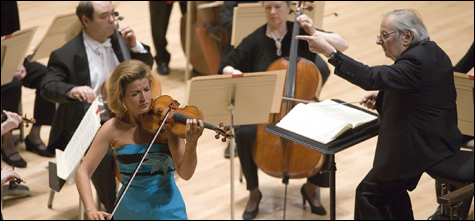
SHAPELY AND SHAPELESS? Anne-Sophie Mutter kept looking over her shoulder at the orchestra, as if she wanted to conduct. |
Music lovers had a tough decision to make last Saturday between two great operas that are rarely performed here. Richard Pittman’s New England Philharmonic, with some high-quality singers and musicians (some of them Emmanuel Music regulars), offered a concert version of Alban Berg’s 20th-century shocker Wozzeck. And Craig Smith’s Emmanuel Music presented Handel’s Alcina, the last in its season series of Handel’s three operas based on Ariosto’s Orlando furioso. (The others were Orlando and Ariodante.) I opted for the road somewhat less traveled, the completion of the trilogy.
Alcina is the closest of the three to comedy, the story of a Circe-like sorceress who loses her powers when she falls in love with one of her captives, Ruggiero. Meanwhile, Ruggiero’s fiancée, Bradamante, comes disguised as a man to rescue him, like Leonore in Beethoven’s Fidelio, and like Leonore she attracts the attention of another young woman, Alcina’s sister Morgana. In the hands of singers like Renée Fleming, Natalie Dessay, Susan Graham, and Jennifer Larmore and a profound stage director like Robert Carsen (in the Paris Opera production I saw in Chicago), it can be both ravishing and heart-rending, given the way both Alcina and Ruggiero are in a perpetual state of inner conflict. (Handel was clearly more touched by the complicated villainess than by the goody-good guys.)
At Emmanuel it was mostly ravishing. The instant the overture began, one could feel the underlying pulse of the music, which Craig Smith maintained through countless arias, a couple of choruses, and one extraordinary trio nearly four hours later. The playing included gorgeous obbligato work by violinist Heidi Braun Hill and cellist Rafael Popper-Keizer, the latter also part of the alert and pointed continuo group with harpsichordist Michael Beattie and lute player Chris Henriksen. The orchestra seemed more engaged in telling the story than some of the singers did.
That was the main problem with this Alcina. Alcina and Ruggiero were soprano Jessica Tarnish and mezzo-soprano Valérie Arboit, both recent graduates of the BU Opera Institute, where they’ve sung major roles in several Mozart productions. (I don’t think I’ve heard Arboit before, but Tarnish had really impressed me.) Yet in some of Alcina’s most remarkable and ambitious music (including the extended scene at the end of act two when Alcina discovers that she’s lost her magic powers and Ruggiero’s heavenly hymn to the loss of natural beauty, “Verdi prati”), neither singer suggested the desperation and tormented inner lives with which Handel endows these characters. I just didn’t care about them.
Tarnish has a big, burnished voice with an appealing flutter, but except for one climactic moment, her top notes seemed consistently undersupported, squeezed, and squeaky, in a role, written for one of Handel’s favorite singers, that requires blazing high notes. Arboit, we were told, was suffering from a cold, but her voice was so warm, so pretty, and her technique so solid, I couldn’t tell she was ill, except that she was rather quiet; whenever she pushed her voice, it blossomed. The most dazzling singing, though, came from coloratura soprano Barbara Kilduff, Morgana. Last year, she knocked me out as the Queen of the Night in Emmanuel’s English-language Magic Flute, and here she did it again, hitting what must have been a high Z, in my favorite Alcina aria, the act-one-ending “Tornami a vagheggiar” (“Come back to enchant me”), the painful and hilarious moment when Morgana falls instantly in love with the disguised Bradamante. Kilduff has appeared at major venues — the Met, La Scala, the Vienna State Opera — but we’re the lucky recipients of her apparent decision to live a quieter academic and domestic life.